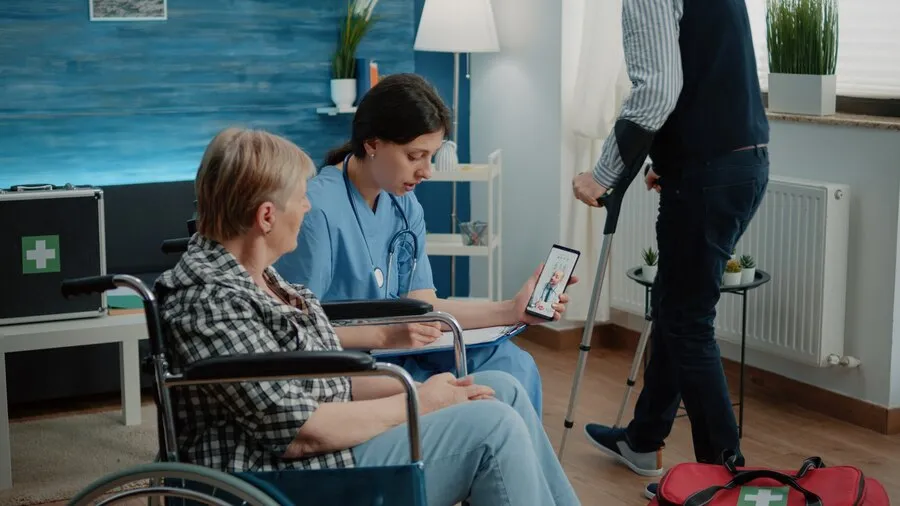Table of Contents
Key Takeaways
- Explore the increasing role of technology in enhancing cognitive engagement for individuals in memory care.
- Learn about popular technologies used today and the benefits they provide in-memory support.
- Understand the challenges faced and future trends in technology adoption within memory care settings.
Understanding Memory Care and Technology
In today’s rapidly advancing world, technology fundamentally transforms how memory care is delivered. This sector focuses on providing personalized care to individuals with conditions such as Alzheimer’s or dementia. With the increase in age-related cognitive challenges, the use of technology in memory care environments is becoming paramount. Not only does it engage residents intellectually, but it also enhances safety and communication. Memory care communities are working tirelessly to integrate these technological advancements into their care models.
Various technological tools are employed across various facilities, including specialized centers such as those in memory care Visalia, to create enriched living experiences. These innovations help residents remain cognitively challenged and emotionally balanced by offering engaging and supportive tools. Thus, technology does not just augment traditional methods; it revolutionizes them by introducing innovative ways to interact with and care for individuals in memory care.
Role of Technology in Cognitive Engagement
Since technology offers a variety of ways to engage seniors intellectually, its function in memory care is becoming increasingly important. Digital platforms have been developed to address various aspects of cognitive function, from memory retention to problem-solving skills. By using apps and devices tailored to the needs and abilities of individuals in memory care, caregivers can offer personalized engagement plans. This level of engagement is instrumental in improving cognitive skills and overall quality of life.
Examples of interactive technology include digital worksheets and puzzles, which can help maintain or improve cognitive functions. Furthermore, these tools can adapt to different difficulty levels, ensuring that each resident can experience success and encouragement, boosting their confidence and mood. This personalized approach to care underscores technology’s potential to bring about meaningful changes in memory care settings.
Popular Technologies in Memory Care
Various cutting-edge technologies are being employed within memory care to invigorate the routines and interactions of residents. Among the most common are interactive tablets, virtual reality applications, and wearable devices. Interactive tablets offer an intuitive interface filled with apps that are not only entertaining but also designed to stimulate cognitive functions. These devices equip residents with recreation and therapy tools, helping them enjoy an active mind.
Virtual reality technology offers fascinating opportunities for immersive experiences, allowing residents to explore new worlds or revisit familiar places. This innovation provides mental stimulation while also serving as a therapeutic escape. Moreover, wearable devices such as smartwatches play a significant role in safeguarding residents by monitoring vital signs and providing real-time updates to caregivers. These technologies showcase a comprehensive approach to maintaining quality and safety standards within memory care facilities.
Benefits of Technology in Memory Support
Incorporating technology into memory care routines provides substantial benefits that can enhance the well-being of residents. Among these advantages is stimulating cognitive functions; technology facilitates mental agility by engaging various brain pathways. Enhanced engagement through technological tools frequently leads to decreased anxiety and depression levels, promoting a sense of normalcy and peace within memory care environments.
Furthermore, research suggests that memory care residents frequently use technology to engage show improved mood and satisfaction. These strategies can foster better mental health by making daily life more engaging and rewarding. When technology is utilized in a caring community where caregivers are prepared to optimize its potential for residents, these advantages are increased.
Also Read: The Best Mental Health Apps of 2024 for Your Well-Being
Challenges and Considerations
While technology presents significant potential, it also introduces challenges and considerations. Caregivers must be adequately trained to use technology effectively to help residents harness these tools for the maximum benefit. Overcoming the learning curve of new technologies requires upfront training and continuing assistance. This knowledge is necessary for the full array of benefits to remain untapped.
Another critical concern is data privacy; ensuring resident data is secure and managed ethically is essential. Technological solutions in memory care require robust cybersecurity measures to protect sensitive information. As these technologies become more integral, facilities must establish clear policies and safeguards to maintain trust and compliance with privacy standards.
Real-Life Examples
Across the globe, many memory care facilities are witnessing transformative results after integrating technology into their care models. For instance, a renowned center in Ohio has implemented VR sessions that allow residents to take virtual tours of landscapes and cities, bolstering mental understanding and engagement. Similarly, personalized music therapy facilitated through digital devices has helped many residents reconnect with memories, fostering emotional connections and interaction.
These success stories underscore the potential of technology to impact memory care profoundly. By providing tools that cater to individuals’ emotional and cognitive needs, facilities can deliver more personalized and effective care, ultimately enhancing each resident’s lived experience.
Future Trends in Memory Care Technology
Looking toward the future, integrating artificial intelligence and machine learning in memory care technologies holds immense promise. These advancements offer even more personalized care solutions by accurately predicting needs and adjusting care routines accordingly. The future will likely see an increase in the adoption of AI-driven tools that provide comprehensive support and insights tailored to individual resident profiles.
Emerging trends emphasize a more interactive, engaging, and adaptive memory care experience. These innovations are expected to profoundly enhance the quality of life for memory care residents, fostering an environment of continual improvement and adaptation in care practices.






